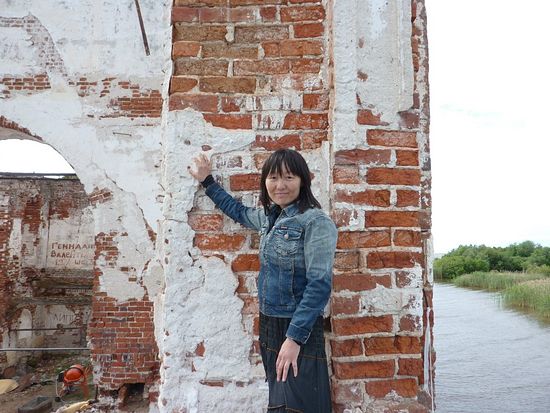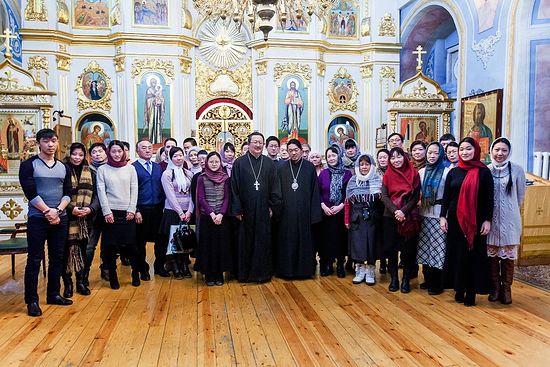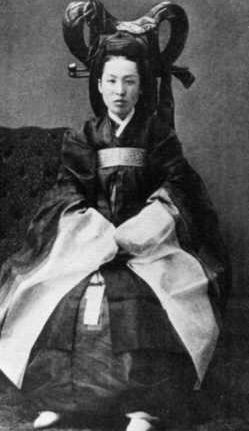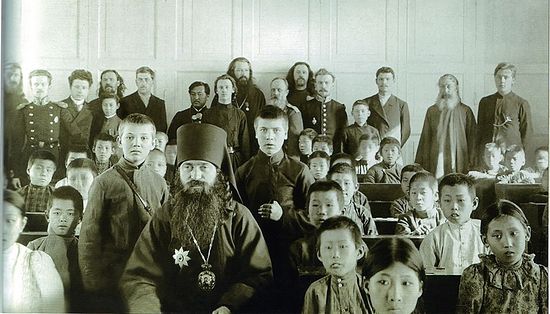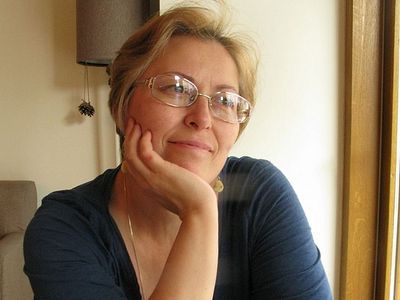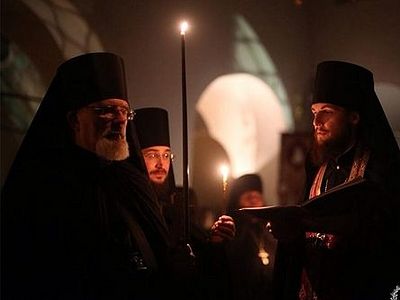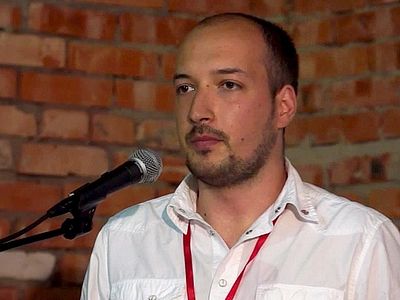About half a year ago SPAS TV channel started broadcasting a new missionary program called My Path To God. The host of the program, Priest Georgi Maksimov, interviews people who converted to Orthodoxy from various non-Orthodox denominations and confessions. They tell us how and why they came to Orthodoxy and how this influenced their lives and the lives of their friends and relatives. Today we are publishing an English translation of the interview with Ksenia Kim, an Orthodox Korean missionary. She talks about her difficult personal choice of faith, the history of Orthodoxy among the Korean people as well as the life of Korean Orthodox community in Moscow and their hopes and expectations.
Priest George Maksimov: Hello. You are watching My Path To God, a program about people who during their journey to Orthodoxy had to give up many things and re-consider their ways. We will talk to our guests about things that motivate them and give them strength. Today our guest is Ksenia Kim, a descendant of Korean people who settled in the Russian Empire more than 150 years ago and seamlessly integrated into the family of peoples of our country. Even before the revolution of 1917, hieromartyr John (Vostorgov) wrote that every year many Japanese, Chinese and Korean people settle in the Russian Empire. He noted that Koreans are the most open to converting to Orthodoxy. Surprisingly, the initiative to convert often came from the Koreans themselves rather than from the Russian authorities or Orthodox clergy. This was the wish of their souls, although, of course, not all the newcomers had it. The revolution of 1917 was followed by a challenging period and the Russian Koreans, just like other peoples of our country, lived through the period of atheism that was forcefully imposed upon our society. Tell me what was the situation in your family and how did you start moving toward Orthodox faith.
Ksenia Kim: I was born in a regular Korean family. Koreans have a difficult spiritual legacy—It is a mixture of Buddhism and shamanism. I remember that my grandmother followed certain rituals. For example, she used to prepare special food and go outside to feed the fallen spirits to please them or ask for help. So if I followed in the footsteps of my ancestors, I would have probably gone in the same direction. However, God gives the right of choice to every person and after comparison and analysis we can make the best decision. My journey wasn’t easy. I studied Islam and Eastern religions, even joined Protestants for a short while. I understood that the truth was in Orthodoxy. It was the only faith that truly touched my heart and I really felt the presence of God there.
Father George: How did you truly discover Orthodoxy? Obviously, you saw churches earlier and maybe even walked into some of them. Yet at some point, you discovered the profundity of Orthodoxy. How did it happen?
Ksenia Kim: When hieromartyr Daniel Sysoyev was murdered in 2009, many people learned about him and started studying the legacy he left behind. My Orthodox acquaintance was one of such people. She gave me the book Instructions For Immortals, or What To Do If You’re Already Dead. I would recommend everybody to read this book. It is fairly short—one can read it in one day—but it totally changes the way you see the world. This is exactly what happened to me. In this book, Father Daniel discusses the Church’s teaching about what happens to people after death. After reading the book, I understood that my prospects were poor. In other words, I was heading straight to hell. But why should I go there, if there is a way to avoid this? I understood that I had to repent. For a long time, several months, I was preparing for confession. It was difficult to remember everything that was done in my lifetime. My first confession took place before Easter. It was a long confession—I entered the church on Holy Saturday at 9 am and left around 4 pm. I still keep in touch with the priest who heard my confession and he still supports me.
Father George: If you went to confession, this means that you were already baptized?
Ksenia Kim: Yes, I was indeed baptized in an Orthodox Church when I was 19, but this wasn’t serious for me then. My friend told me that she was going to be baptized and I decided that I’d do this as well, to keep her company. We memorized the Lord’s Prayer and went to the baptism ceremony. There was no mandatory catechesis at that time and I knew nothing about Orthodoxy, so this did not influence my life in any way. My real conversion happened after reading Father Daniel’s book and after my confession I started leading the church-based way of life. Later, I found the address of the Church of Apostle Thomas on Kantemirovskaya street in this book, so I came to this church and became a parishioner. So Father Daniel Sysoyev through his book influenced my life and my enchurchment. The blood of martyrs is indeed the seed of the Church. My conversion was directly influenced by the death that God bestowed upon Father Daniel. During the years of my enchurchment, I met other people who came to God either after the death of Father Daniel or after listening to or reading this works. Nobody really knows the number of such people, but I’m sure that this number is high.
Father George: Yes, I also know such people and I think their number will be growing. How did your relatives react to such change of your life priorities? Were they sympathetic, did they follow your choice?
Ksenia Kim: Their first reaction wasn’t very positive, but now my relatives (about thirty of them in Moscow) are fairly tolerant and even sympathetic to a certain extent. That is why I’m hoping that God will gradually grant them the joy of being Orthodox. My sister who lives in Irkutsk has already been baptized. This was quite a story—we had to fight fallen spirits for her, as they didn’t want to let her go. They tempted and scared her so much, that we had to ask the priests for help. A week before her baptism demons started visiting her, she actually saw them, they seized her by the throat, attacked her in other ways, knocked on the door. She couldn’t’ sleep a wink for a week. We were afraid that she would lose her sanity, so I called some priests I knew and they said that my sister should rejoice. I was very surprised to hear that as it seemed that there was nothing to be happy about, but the priest said: “She should rejoice, for if God allows her to see them, it logically means that the opposite is true too, in other words that means that there are good spirits too and that God exists too”. The demons try to make people stop believing in their existence and in the existence of supernatural world altogether, and here their actions were so obvious that they couldn’t be ignored.
Father George: Did those attacks of evil spirits stop after the baptism?
Ksenia Kim: Pretty much. They continued for some time after that, but soon stopped completely.
Father George: It’s important to emphasize this, because it is not only your sister; I also know about other similar cases that happened when adult people realized that they needed to be baptized. Sometimes evil spirits try to stop them. All of a sudden people don’t feel well, some even faint right before the baptism. Evil spirits try to attack or tempt such people. However, after baptism the evil spirits lose their powers and all the attacks stop, just as happened with your sister.
Ksenia Kim: It is interesting to note that I, as a participant in those events, was also affected. Despite thousands of kilometers between us (I was in Moscow, while she was in Irkutsk), when these events occurred over there, my faith was tested too. Once I came home and saw that my place was swarming with large flies, although when I left all doors and windows were closed and everything was fine. This was very strange. Where would those files come from all of a sudden? It took me several days to get rid of them. When later I mentioned this to my Orthodox friend, he said: “Didn’t you realize what that was? Do you remember that one of Satan’s names is Beelzebub? It is translated as “lord of the flies”. So, this means that he visited my home.
Father George: The hagiography of one ancient hermit mentions that to distract him from praying, Satan filled the hermit’s cave with a multitude of insects. But he didn’t succeed. The event you described clearly shows that Satan has very little power over Christians. We know that evil spirits would like to destroy the human race, but because God protects Christians, all the evil one could do was this petty trick in hope to confuse the person. God’s blessing protects Orthodox Christians who lead a church life. Of course, Satan would like to harm us more, but Got won’t let him. Whenever God allows any temptations to happen to us, including those that involve direct contact with evil forces, this is never beyond our strength. Only as much as a person can withstand. And God is always nearby; He is always willing to give His help to those who ask. The experience of every believer proves that.
Ksenia Kim: There was another event with my sister. I sent her Orthodox leaflets and books about baptism, confession and communion for distribution in churches before the Epiphany. When she had to go to the airport to pick up these materials, she felt so sick that she nearly died. They managed somehow to find people who picked the materials up. Later she told me: “Can you imagine, as soon as I delivered those materials to churches, everything was back to normal”. The sickness came out of nowhere and was gone inexplicably.
Father George: Thank God! I know that it is not only you and your sister, other Koreans also find their path to Orthodoxy. I even know that we have a Korean Orthodox community here in Moscow and that you are an active member. Could you tell us more about it?
Ksenia Kim: Yes, there is a Korean Orthodox community in Zaikonospassky monastery in Moscow. First attempts to establish this community were made in 2001 when we organized catechesis studies for Koreans. Later we also organized some children programs, field trips and pilgrimages. The activities were on and off. Finally, God’s will was to send us a priest, Father Alexander Son, and now the community has a priest of Korean descent who takes care of us.
Father George: Does your community cooperate with other public organizations of Russian Koreans?
Ksenia Kim: Yes, of course. We worked with the Korean Youth Club. There is also a newspaper, Rossiyskiye Koreytsy (Russian Koreans), which has a staff employee designated for interacting with the Orthodox Church. We also actively work with the Russian Association of Koreans. With the help of Zaikonospassky monastery and this association, we organized a big conference, Koreans and Orthodoxy, in the spring of 2014. This event was dedicated to the 150th anniversary of Koreans’ settlement in Russia. We had a round table with the heads of regional branches of the Association of Koreans where we adopted a resolution on starting a project for development of regional missions in Russia. We wrote an application to His Holiness. Our hierocracy supported the project and active work to establish contact between the missionary departments of dioceses of Russian Orthodox Church and regional branches of Association of Koreans is currently under way. Three pilot projects are already in the works in Southern, Central and Far East federal districts.
Father George: Are there places in Russia where the Korean population is larger?
Ksenia Kim: Historically, many Koreans live in the Far East, specifically in Khabarovsk and Primorsky Krai. According to statistics, Koreans are the third largest ethnic group there. Naturally, our priority is working in those regions, but we hope that with God’s help we will expand into other cities.
Father George: I remember how I felt when I was reading the notes of missionaries and people who lived in Korea more than century ago. They saw that for a long time the Korean people were caught in the middle between China and Japan and were periodically subjected to oppression by their neighbours. Korean people did not benefit from it. I saw that as soon as Korea became an independent country, Korean people made a huge step in their development. It clearly shows that its potential was previously supressed. Korean people were exhausted by their long-time neighbours. At that time the Japanese and Chinese were fighting over the right to rule the Korean people. When the Koreans learned that they had a third neighbour, Russia, they were very happy. That was when the extensive immigration started. It is a known fact that the Korean Queen Min was assassinated because she was leaning toward Russia. King Gojong and royal prince were actually placed under house arrest. They managed to escape to the Russian consulate and for more than a year the king was ruling the country from there because it was unsafe for him to leave the consulate. Everybody understood what was going on. This, basically, explains the choice the Koreans made about immigration to Russia and why the Koreans, both those who immigrated to Russia and those who stayed in Korea, began converting to Orthodoxy... It was a voluntarily decision of the people. That is why I hope that with God’s help the work that the Korean community is currently doing will be crowned with success. This would be the result of the choice many Koreans made over a hundred years ago, but that process was, one might say, frozen by the period of Soviet atheistic rule. I’d like to ask you your personal opinion: To what extent do contemporary Koreans have a need for Orthodoxy?
Ksenia Kim: Thank you for this historical side note and your question. Our current missionary activities in the region are primarily aimed at counteracting the Protestants who actively preach among the Russian Koreans, presenting Protestantism as the true Korean religion. They misguide our people, saying that it is the Korean religion, while in fact Orthodoxy is our historic legacy and spiritual tradition. When our ancestors received the citizenship of the Russian Empire, they also received baptism. It was a deliberate and voluntary action. That is why it is important to inform the people and do something lest 20 years from now all Russian Koreans are Protestants. I would not like that to happen, but risk of this happening is quite real because the Protestant missionaries are very active. First of all, we need to pray for deliverance of our people from this, dare I say it, sectarian slavery. There are many active sects in the Russian Federation and one of them has three hundred Korean members. Based on that we can estimate the size of those sects.
Father George: Of course, people have the right to learn the truth about Orthodoxy. They should know that Orthodoxy is not simply a part of the Russian culture, but that it is the Church founded by Jesus Christ Our Lord himself. That way rather than making their choice based on some unverified information, they can do so knowing where the truth is and where the true Church of Christ is. Naturally, this requires a lot of effort.
Ksenia Kim: Yes, the desire to find the truth is also needed. It is amazing, that despite the small number of Orthodox Koreans, God leads us to himself. Even more amazing is that people in South Korea, where the majority profess Protestantism, are also converting to Orthodoxy. We hope that God would give us a chance to build the church, because even now when we try to oppose Protestants in Moscow, we unfortunately can’t offer an alternative to people who are used to active community life. All Orthodox Koreans go to various churches and only gather in Zaikonospassky monastery for some joint events or studies. I think that for the purposes of missionary work it would be great to have a church that Koreans could visit for quiet prayer. So that there is no misunderstanding among the parishioners. If a hundred Koreans come to one church, this would probably give the Russian old ladies quite a scare (laughs).
Father George: By the way, how did the parishioners of Zaikonospassky monastery receive your community?
Ksenia Kim: They got used to us gradually. However we don’t go there in hundreds, usually there are about twenty of us there during the service. It’s not a large percentage of the total number of parishioners. They know that there is Father Alexander who takes care of us, so they are friendly toward us.
Father George: I also wanted to ask you if you had any contacts with people from Korea who temporarily or permanently reside in Moscow. Do you have a rapport with them? I once talked to an Orthodox Korean who grew up in the Far East, then moved to South Korea for some time and later came back to Russia. He told me that living in his historical homeland was difficult for him. Everything was strange and unclear. He even had some kind of culture shock. We have very few people from North Korea here, but what is your relationship with people of South Korean descent? If you had any experience, what was your impression?
Ksenia Kim: Yes, I’ve met South Koreans. As a rule, most of them are leaning toward Protestantism. Very few are Orthodox. In general, they adapt here without problems and get on well with the locals. Mostly they are businessmen from South Korea and students. We had an idea to organize Russian language lessons for these Koreans from Korea. The newly passed law requires foreign citizens intending to live in the Russian Federation to speak Russian, know Russian history and culture, and pass a special test. We would like to help people with this. And of course we wouldn’t be helping South Koreans only. For example, we recently received a letter from a priest from Siberia who baptized a North Korean. This North Korean didn’t even speak Russian, so I can’t imagine how this miracle could happen…That man was sick, and as he was in a grave condition, he stayed at a hospice. The priest asked us to send him Orthodox prayers in Korean as soon as possible. So we had to find Korean translations of Lord’s Prayer, “Theotokos and Virgin rejoice…” and Creed.
Father George: What else does the Moscow Korean Orthodox community do?
Ksenia Kim: With the help of Zaikonospassky monastery, our community holds theological courses for adult Koreans. The course subjects include liturgics, Church Slavonic language, catechesis, and Gospel according to the Holy Fathers. For missionary purposes, we also organized free Korean language courses in Zaikonospassky monastery. In addition, our community organizes various field trips, pilgrimages and meetings. We are also planning to cooperate with the Korean Youth Committee in social networks and websites.
Father George: This is a very valuable experience. I saw similar initiatives from Orthodox people of various ethnic backgrounds, for example Orthodox Kurds or Kazakhs that live in Moscow. They also wanted to get together in a single group in some parish, but unfortunately these attempts did not come to fruition even though it was a grassroots initiative that came directly from the people. Moscow Koreans, thank God, succeeded, so I think that the example of your Korean community could be useful not only for Koreans, but for other ethnic groups as well.
Ksenia Kim: God indeed is very benevolent toward us; we can feel it because we get a lot of help from everywhere. A lot of God’s grace too. Unlike Russians who have numerous saints and many people praying for them, it is very difficult for us. Every third Russian has people who served God somehow, maybe even saints, among his or her relatives. Russian people get tremendous spiritual support from this multitude of people who pray for them. We don’t have that. In many cases, we are descendants of atheists, pagans and shamans. Our people only now are gradually becoming Orthodox, and that is why God bestows us with His special grace. How Russian monks are rejoicing looking at us is particularly amazing. This is great. They are sincerely, almost child-like, happy to see that we, non-Russians, Koreans, are in fact Orthodox. It is very important to know that God is with us, that He doesn’t abandon us and gives us His support. This, of course, gives us a strong motivation to do more. We have many plans and a great desire to promote spiritual education of children, do social activities, work with youth, and many other things. We hope that God will help us and ask you to pray for the salvation of the Korean people. You know, God doesn’t differentiate between nationalities or ranks.
Father George: Of course, the truth is for everyone. I believe that God arranges the life of every person. It is not an accident that you and other Koreans are in Russia and that you were raised in a culture with Christian roots. This is God’s loving gift to you. I have another question for you: Can you tell us any stories about conversion of other members of Korean community? How does God lead them to Orthodoxy?
Ksenia Kim: Sure. There is a story of one woman that I remember particularly well. I won’t mention her name. She had a terrible experience—her child fell out of the window of a multi-storied building. This Korean woman was not a very religious person, but she knew about Orthodoxy and Mary the Mother of God. By some miracle, when she saw the open window and realized what happened, she threw herself down on her knees and cried: “Mother of God, please have mercy on my son!” When that woman came down, she saw that amazingly her child was safe and sound and didn’t even have a scratch. They called the ambulance, of course. It turned out that the child only had a broken ankle. His spine, head, arms and legs were not harmed. This made such a great impression on her husband and herself that they went to church and started living a church-based life. God moves in mysterious ways. Some people take a long journey seeking the truth, while others are converted through such incredible events.
Personally, I am eternally grateful to God for arranging things so that I was born in Russia, an Orthodox country, and making me an Orthodox Christian. I think this is the greatest gift in the world. I am even more grateful for it than I am grateful for my life. I can honestly tell you, that when I attend a service, my eyes are filled with tears, the tears of gratefulness for allowing me to be a part of this great spiritual legacy of humankind. And I am very sad when I see Russian people, people who have everything—a great number of saints and pious ancestors who pray for them—and yet these people do not participate in the Church life, do not receive Communion and do not go to church. I feel pain and sadness for such people. God led us, non-Russians, to this greatest legacy, this Noah’s Ark, this huge ship, while some people reject all this on their own accord.
Father George: I read hieromartyr Grigori’s (Lebedev) explanation of Jesus’s words A prophet is not without honour, but in his own country, and among his own kin, and in his own house. (Mark, 6:4). He said that this applies not only to Jesus Christ or a saint, but to Christianity in general. It is without honour in the community that has Christian roots and maybe even exists because in the past ancestors of these people became Christian. There is also a negative effect, when people from Orthodox ethnic backgrounds, not only Russians, are satisfied by a very superficial knowledge of Orthodoxy—they pick up holy water, bless an Easter cake, light a candle—and that is it. Even though that is all they know about Christianity, they have a false impression that since Christianity is ours anyway, it is not very interesting. When such a person starts his or her spiritual quest, he or she thinks: “Well, Christianity is just Easter cakes and candles. This is not interesting. Spiritual things must be somewhere far way, it can’t be nearby”. So sometimes Russian people have to make a very long journey and wander the darkest corners of the world only to discover with amazement that the Truth they were searching for is where they least expected it to be. Thank you for reminding us about this and for your story. I wish you God’s help in your spiritual journey and the activities of your community.
Ksenia Kim: Thank you.
